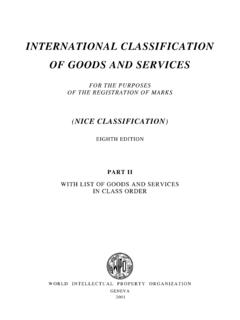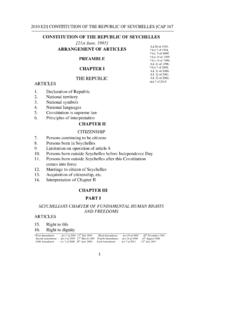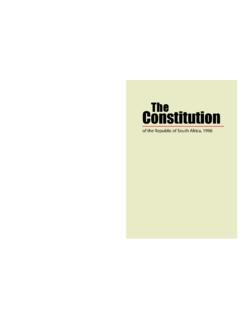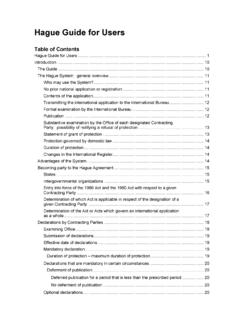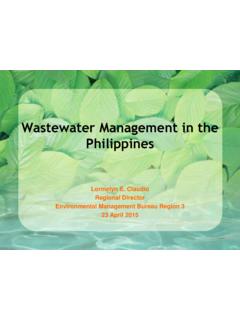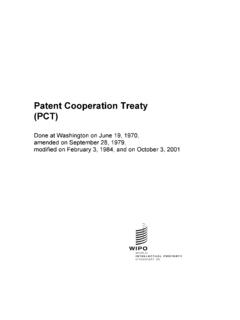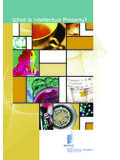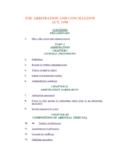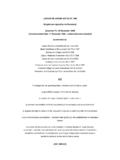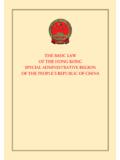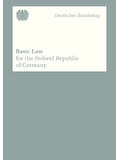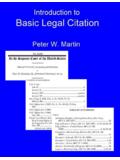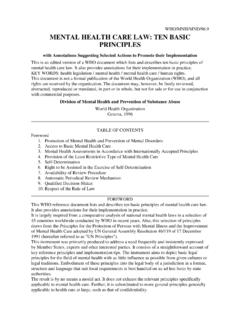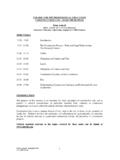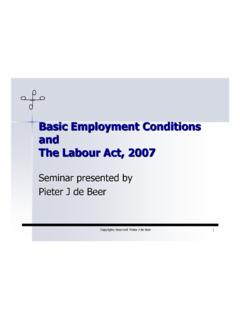Transcription of ROYAL DECREE NO. (101/96) Promulgating the …
1 ROYAL DECREE NO. (101/96) Promulgating the Basic Statute of the State We Qaboos bin Said, the Sultan of Oman Confirming the principles that guided the policies of the State in various fields during the past era; Resolving to continue our efforts for the development of a better future characterised by further achievements for the benefit of the Country and the Citizens; Consolidating the international status that Oman enjoys and its role in establishing the foundations of peace, security, justice and cooperation among various states and people; And in pursuance of the public interest; Have decreed as follows: Article One: The Basic Statute of the State is hereby promulgated as per the attached text. Article Two: This DECREE shall be published in the Official Gazette and shall come into force on the date of its issue. Issued on: 24th Jumada AI Akhira 1417 Corresponding to: 6th November 1996 Qaboos bin Said Sultan of Oman ROYAL DECREE NO.
2 99/2011 Amendment to Some Provisions of the Basic Statute of the State We Qaboos bin Said, the Sultan of Oman Stemming from our belief in the importance of developing the march of Shura in the Country to serve the interests of the Country and Citizens and in confirmation of the importance of the participation of all individuals of Society in the comprehensive development march in line with the requirements of the desired progress; And having perused the Basic Statute of the State promulgated by ROYAL DECREE No. 101/96; And in pursuance of the public interest; Have decreed as follows: Article One: The attached amendments shall be made to the Basic Statute of the State. Article Two: All that contravenes with this DECREE or its attached amendments or contradicts with their provisions shall be deemed repealed. Article Three: This DECREE shall be published in the Official Gazette, and it shall come into force from the day following its date of publication.
3 Issued on: 21st of Thu Al Qi'dah 1432 Corresponding to: 19th October 2011 Qaboos bin Said Sultan of Oman THE BASIC STATUTE OF THE STATE CHAPTER ONE The State and the System of Governance Article (1) The Sultanate of Oman is an Arab, Islamic, Independent State with full sovereignty and Muscat is its Capital. Article (2) The religion of the State is Islam and Islamic Sharia is the basis for legislation. Article (3) The official language of the State is the Arabic language. Article (4) The Law determines the Flag, Emblem, Insignia and National Anthem of the State. Article (5) The system of governance is Sultani1, hereditary in the male descendants of Sayyid Turki bin Said bin Sultan, provided that whomever is to be chosen from amongst them as successor shall be a Muslim, mature, rational and the legitimate son of Omani Muslim parents. Article (6) The ROYAL Family Council shall, within three days of the throne falling vacant, determine the successor to the throne.
4 If the ROYAL Family Council does not agree on a choice of a Sultan for the Country, the Defence Council together with the Chairman of Majlis Al Dawla2, the Chairman of Majlis Al Shura3, and the Chairman of the Supreme Court along with two of his most senior deputies, shall instate the person designated by His Majesty the Sultan in his letter to the ROYAL Family Council. Article (7) The Sultan, before exercising his powers, shall, in a joint session of Majlis Oman4 and the Defence Council, take the following oath: 1 ROYAL 2 State Council 3 Shura Council 4 Oman Council "I swear by Allah the Almighty to honour the Basic Statute of the State and the Laws and to fully safeguard the interests of the Citizens and their freedom and to preserve the independence of the Country and its territorial integrity". Article (8) The Government shall continue to perform its functions as usual until the Sultan is chosen and exercises his authority.
5 Article (9) The Governance in the Sultanate shall be based upon justice, Shura and equality. The Citizens, pursuant to this Basic Statute and the conditions and provisions prescribed by the Law, shall have the right to participate in public affairs. CHAPTER TWO The Principles Guiding the Policy of the State Article (10) The Political Principles: Preserving the independence and sovereignty of the State and safeguarding its entity, security, stability and defending it against all aggression. Reinforcing ties of cooperation and reaffirming friendly relations with all states and nations on the basis of mutual respect, common interest, non-interference in the internal affairs and adherence to the international and regional charters and treaties and the generally recognized principles of international law conducive to the advancement of peace and security among states and nations. Laying suitable foundations for consolidating the pillars of genuine Shura emanating from the heritage of the Nation, it s values and Islamic Sharia, taking pride in its history and adopting the useful contemporary means and instruments.
6 Establishing a sound administrative system that guarantees justice, tranquillity and equality for the Citizens and ensures respect for the public order and the preservation of the supreme interests of the State. Article (11) The Economic Principles The national economy is based on justice and the principles of free economy. Its essence is the constructive and fruitful cooperation between public and private activity. Its objective is the achievement of economic and social development in order to increase production and raise the standard of living of the Citizens according to the general plan of the State and within the limits of the Law. Free dom of economic activity is guaranteed within the limits of the Law, the public interest, and in a manner that ensures the integrity of the national economy. The State encourages savings and supervises the regulation of credit.
7 All natural wealth and resources thereof are the property of the State, which shall preserve and utilise them in the best manner taking into consideration the requirements of the security of the State and the interests of the national economy. No concession or investment of any public resource of the Country shall be granted except by virtue of a law, for a limited period of time, and in a manner that preserves national interests. Public property is inviolable, the State shall protect it, and Citizens and residents shall preserve it. Private ownership is safeguarded and no one shall be prevented from disposing of his property except within the limits of the Law. No property shall be expropriated except for the public interest in cases stipulated by the Law and in the manner specified therein, provided that the person dispossessed shall be fairly compensated. Inheritance is a right governed by Islamic Sharia.
8 General confiscation of property is prohibited. The penalty of specific confiscation shall only be imposed by virtue of a judicial decision and in such circumstances as prescribed in the Law. Taxes and general charges are based on justice and the development of the national economy. Imposition, amendment, and abolition of public taxes, shall only be by virtue of a law and no one is exempted from paying all taxes or part thereof except in the circumstances prescribed in the Law. It is not permissible to introduce a new tax, fee or any right of any type whatsoever with retrospective effect. Article (12) The Social Principles Justice, equality, and equal opportunities between Omanis are pillars of the Society guaranteed by the State. Collaboration and compassion are intimate bonds amongst the Citizens. The reinforcement of the national unity is a duty. The State shall prevent anything that might lead to division, discord or disruption of the national unity.
9 The family is the basis of the society and the Law regulates the means for protecting it, preserving its legitimate entity, strengthening its ties and values, safeguarding its members and providing suitable conditions to develop their potential and capabilities. The State guarantees aid for the Citizen and his family in cases of emergency, sickness, disability, and old age according to the social security scheme. The State shall work for the solidarity of the Society in bearing the burdens resulting from national disasters and catastrophes. The State is responsible for public health and the means of prevention and treatment of diseases and epidemics. The State endeavours to provide healthcare for every Citizen and encourages the establishment of private hospitals, polyclinics and medical institutions to be under its supervision and in accordance with regulations determined by the Law.
10 The State also works for the conservation of the environment, its protection, and the prevention of pollution. The State enacts laws for the protection of the employee and the employer and regulates the relationship between them. Every Citizen has the right to engage in the work of his choice within the limits of the Law. It is not permissible to impose any compulsory work on anyone except by virtue of a law, for rendering a public service, and for a fair remuneration. Public employment is a national service entrusted to those who carry it out. The State employees, while carrying out their work, shall pursue the public interest and service of the Society. Citizens are considered equal in taking up public employment in accordance with the provisions stipulated by the Law. Article (13) The Cultural Principles Education is a cornerstone for the progress of the Society which the State fosters and endeavours to disseminate and make accessible to all.

